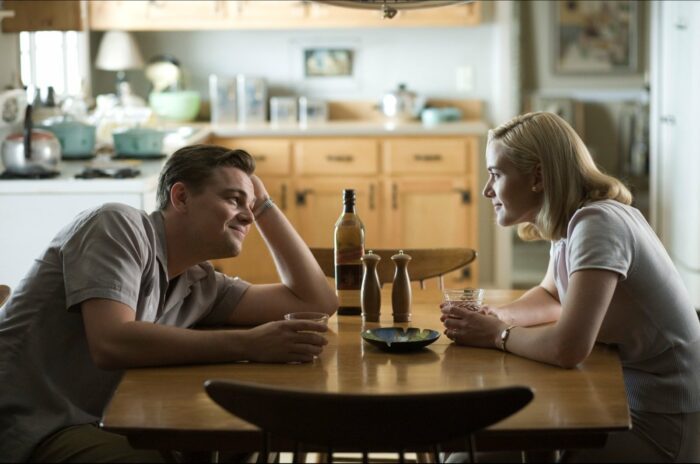May is Mental Health Awareness Month and here at 25YL, we want to highlight some of the films that spoke to us directly about this sensitive subject. This week, Lindsay Stamhuis looks at Sam Mendes’ 2008 adaptation of the 1961 novel Revolutionary Road, starring Kate Winslet and Leonardo DiCaprio.
Mental health and wellness is still a taboo subject and the reasons for that—in this day and age—are far too numerous and depressing to adequately address in a forum such as this. Things are getting better. Awareness around the subject of mental health has risen; treatments for mental health-related illnesses (everything from mindfulness and meditation to prescription medication) are gaining acceptance as the stigma around the topic disappears. But even though the world we inhabit has changed dramatically since the Diagnostic and Statistical Manual of Mental Disorders (DSM) was first published in 1952, we have a long way to go before we can say we—as a society—are capable of really dealing with this subject appropriately, sensitively, and in a timely manner.
The stark reality of mental illness, and how little progress we seem to have made, is really only readily apparent when we contrast it to where we used to be. In the 2008 film Revolutionary Road, itself based on a 1961 novel of the same name by Richard Yates, is one of those works of fiction that holds a mirror up to our present and asks us pointed questions about who, what, and how we ought to be; in this case, those questions hinge on the struggles facing the central couple, their responses to them, and the way their own society is both pushing them and holding them against their will.
It’s a remarkable feat, considering that Yates is so critical of the time period in which he was writing and yet also manages to be critical of our own society. When the Sam Mendes-directed and critically lauded film adaptation was released, we were in a watershed year, especially in the political landscape of America. The rise of the “moral majority” and the evangelical right had seemingly hit a crescendo and Barack Obama was soon to be elected President in what appeared to be a swinging correction towards the left. Of course time would show that the far-right was far from finished, and as the Tea Party became the Republican Party and moral righteousness once again invaded the top levels of government the world over, it became very clear that progress would be stifled; that has, unfortunately, come true, what with the rise of white nationalism, neo-Nazis, and legislators reopening the legal debate over women’s reproductive health. (There ain’t no party like a Puritan party, apparently…)
So perhaps it’s timely to once again look at Revolutionary Road, 58 years after its publication and 11 years after the film hit our screens, and it’s fittingly appropriate that we’re having this conversation during Mental Health Awareness Month. Revolutionary Road critically examines how the intersection of personal mental health and the society in which you live can have disastrous consequences when the balance is off-kilter.
Our story focuses on Frank (Leonardo DiCaprio) and April Wheeler (Kate Winslet), a young couple beginning their lives together in their little suburban Connecticut enclave of Revolutionary Road. Theirs is a tale as old as time…if time is roughly contained to the middle 20th century through to the present day: they met as young adults, with dreams of an exciting future away from the docks (his) or on stage in front of an adoring crowd (hers), fell madly in love, and promptly got married and started a family away from their bohemian life in Greenwich Village. Frank “mans up” and takes a job at the company where his father has worked for his entire career, and April gives up her Broadway aspirations to become a stay-at-home housewife, with only local repertory theatre performances to keep her creatively occupied.
It quickly becomes apparent that life in the suburbs suits neither of them particularly well. April suggests to Frank that they should get a change of scenery; she wants to move to Paris. Initially, Frank balks but gradually he comes around to the idea. Only when April discovers she is pregnant again that they are forced to reconsider. Frank is offered a promotion that he can’t easily turn down. The issue hanging in the balance is the choice between the life they could have had but don’t or the life they don’t want but have.
If that were the only problem facing the Wheelers, this story would be a great deal easier than it actually is; it may even have had a happy ending. As it is, though, things are far more complicated. To catalogue the list of pathological actions and thoughts and behaviours that April and Frank engage in would be an interesting experiment in and of itself; they are certainly quite cruel and unique as far as 20th-century characters go in the sense that they really don’t have many redeeming qualities. Richard Yates is careful to paint a portrait of suburbia that is bleaker and darker than virtually any other author has managed to do; more frightening than Stepford, somehow. But he fills these foregrounded characters with enough major flaws to wonder how/if we can ever truly root for them. They cheat on one another; they lie, to themselves and to each other; they gaslight; they argue incessantly and when they do, they say cruel things that no one should ever have to hear from their loved ones. Theirs is a strangely manipulative relationship; it’s certainly an abusive one, in many ways.

But the issue is, of course, we do root for them, sort of. We sympathize with April’s desire to step outside the constricted bounds of 1950s suburbia and the role she’s been forced to perform. Like Betty Draper in Mad Men (which, incidentally, also arose in the same vicinity as the film adaptation of Yates’ novel and deals with many of the same issues), April feels confined and sees no way out of the life that landed on her doorstep when she first became pregnant and she and Frank moved away from the city to start the family that neither one of them truly wanted. On the surface, her desire to move to France is so that Frank can “find himself”—a concern than many today are only too familiar with—but whether that’s true or not is secondary to the fact that we know she is miserable. She’s grasping at straws trying to hold together the life she was trying to build with “the most interesting person [she’s] ever met”. It’s relatable.
Frank may be harder to sympathize with on the surface but his need to be adored by April the way he adores her is also relatable, more so than we might otherwise care to admit. His love for April is one of the purest things, even if it’s broken them both; he so desperately wants to be that interesting man and puts on airs of ironic detachment—from his job, from his father, from their neighbours and friends, from society at large—in order to appear to still be counter-cultural when, in fact, he almost kinda sorta likes living on Revolutionary Road. He likes his job and likes providing for his family. He desperately doesn’t want to move to Paris. Is he afraid of “finding himself”? Or is he already there?
And if he is there…what does that make him in April’s eyes?
Best to lie and cheat and bury it deep, and when the cookie crumbles, blame her for it all, right?
This inability to face truths with one another is what propels the Wheelers on a collision course with fate. It seems inevitable that April will attempt to terminate her pregnancy via vacuum aspiration near the end of the film. Frank won’t allow it—he claims the moral high ground but it seems likelier that he feels personally rejected by April, the woman he adores, because she admits, openly, to never truly wanting to carry his babies—even though, deep down, he admits to wanting it, too.
April’s death sits like a heavy cloud over the entire film, before and after we see her bleeding out and calling an ambulance. We can’t blame her for desperately wanting to end the thing that tethers her to the life she hates but it’s folly to believe that ending her pregnancy would have the outcome she desires. She and Frank would never make it back to the smoky apartment in the Village; they’re never going to Paris. Their love is over. So why did she do it in the first place?
Then, as now, the pressure from outside forces to be a mother take precedence over everything else. It’s crazy to want an abortion. And that idea of “craziness” is shown perfectly clearly (perhaps a little too on the nose) in the character of John Campbell, the mentally unstable son of the Wheelers’ realtor (Kathy Bates). Once a promising and brilliant mathematician, John’s mental illness forced his parents to institutionalize him, where he received electroshock treatments that didn’t cure his instability but did remove his mathematical ability. John is the only person to see through the ruse that the Wheelers are putting on; it’s John who confronts Frank about his decision to stay in Connecticut and have another baby. Once upon a time, April and Frank found John’s ability to “get” them eye-opening and inspirational; now, his late-stage Delphic straight-talk is nothing more than salt on a gaping, festering wound. The fight April and Frank have that night is what precipitates April’s fateful decision to take matters into her own hands the very next day.
As much as it pains me to see mental illness passed off as some kind of magical ability to speak deep truths the “normies” can’t see, John’s character is vital to the story. Because both April and Frank believe they must be crazy, too, to not be happy with what they have. And, in the late 1950s, society would have very quickly and easily told them they were crazy; we saw that with Betty Draper in Season 1 of Mad Men, laying on the psychiatrist’s couch after her hands start going numb and she realizes she’s not happy with suburban oblivion either. That DSM-I referenced earlier contained all sorts of diagnoses for all sorts of disorders that a doctor could easily have applied to either Frank or April. Emotional instability was a personality disorder; so was passive-aggressiveness. We recognize these things today for what they are—manifested symptoms of the struggle for individuality in the face of overwhelming conformity, boredom with one’s lot in life, and the desire to be more and do more with the six or seven dozen years we’ve been given on this planet.
Back then, you were crazy.
I’d love to say that things are different today. But the stone cold fact remains that far too many people are pigeon-holed into lives they don’t necessarily want to lead. LGBTQ+ youth are committing suicide in record numbers because they feel unaccepted by their families, their peer groups, or society at large. Boys are still told to “man up” and stop crying, Gillette commercials notwithstanding. And as Margaret Atwood and her fictional Handmaids can attest, the Draconian laws cropping up restricting access to contraceptives, adequate maternal health care, and abortions mean that what happened to April Wheeler in a 1961 novel is a few pen strokes away from happening to our neighbours in 2019.
Dissatisfaction is a prerequisite for some forms of success; we should want to be better and do more. But when life gets too hard, and decisions become too difficult to make, the structures of our society should not make it even harder to fix things. Richard Yates, writing in the middle of the last century, crafted a brutally beautiful (or beautifully brutal) account of one couple’s struggle to accept or reject the life they are leading because of the choices they made and the cards they were dealt by the largely unforgiving society of Atomic Age America. In 2008, with hope on the horizon, Sam Mendes’ film puts the spotlight on this bygone time as if to say “We dodged a bullet…it was bad for a while but look where we are now.”
Today, what does this film say to us? How does it resonate? I think, in all eras, we can all only answer this question by looking at our own lives deeply, and truthfully.
If you are in crisis or you think you may have an emergency, call your doctor or emergency services immediately. If you’re having suicidal thoughts, call your local emergency line immediately.




How can you even consider Frank as in love with April? He’s a bossy, violent, oppressive, envious, selfish, childish character. There’s no love at all here. At all.
How can you even consider Frank as in love with April? He’s a bossy, violent, oppressive, envious, selfish, childish character. There’s no love at all here. At all.